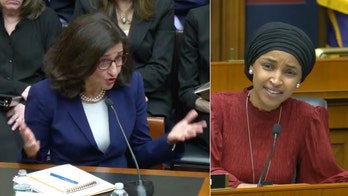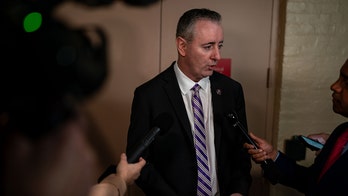Voters will go to the polls this November with control of Congress at stake. Yet most voters say when they pull that lever, they will be sending a message to the White House, according to a Fox News poll.
The poll, released Friday, finds that 41 percent of voters will cast their ballots to register opposition to President Obama's policies. A third (33 percent) will vote to express their support. The policies of the administration will not be a factor for 20 percent of voters.
Most Republicans — 72 percent — describe their midterm vote as expressing opposition to the Obama administration. That's a bit higher than the 64 percent of Democrats who say their vote will express support. One in 10 Democrats will vote to express opposition to the president (11 percent).
Independents are nearly 20 percentage points more likely to say their vote will express opposition (41 percent) rather than support (23 percent) for Obama policies. Thirty-three percent of independents say the administration won't influence their vote.
If the election were held today, 41 percent of voters would back the Republican candidate in their congressional district and 37 percent would vote for the Democratic candidate. That's little changed from two weeks ago when the vote favored the Republican candidate by 42-40 percent (June 29-30).
Most Democrats (79 percent) and Republicans (83 percent) would support their party's candidates. In a turn-around from the last poll, independents are more likely to vote for the Democratic candidate by a 31 to 25 percent margin. Two weeks ago, independents favored the Republican by 7 points.
Almost all voters — 91 percent — are at least somewhat interested in the November elections. More Republicans (66 percent) than Democrats (52 percent) say they are "extremely" or "very" interested.
Among voters who are "extremely" interested, 54 percent say they would back the Republican candidate in their district. Half as many (27 percent) say they would vote for the Democrat if the election were today.
Voters who consider themselves part of the Tea Party movement would vote for the Republican candidate by a 68-11 percent margin.
By 50-36 percent, more voters think Democratic control of Congress and the White House for the last year and a half has been bad for the country.
By 43-36 percent, more think it would be better for the country if Republicans win control of Congress in this year's election. Fifteen percent don't think it would make a difference either way.
The national telephone poll was conducted for Fox News by Opinion Dynamics Corp. among 900 registered voters from July 13 to July 14. For the total sample, the poll has a margin of sampling error of plus or minus 3 percentage points.
Bill Clinton Has the Most Political Capital
Nearly half of voters (49 percent) would be less likely to vote for a candidate if President Obama campaigns for them. That's 10 points higher than the number that would be more likely to vote for that candidate (39 percent).
It's about the same for former Republican vice presidential candidate Sarah Palin: 51 percent would be less likely to vote for a candidate she backs and 37 percent more likely.
Former Republican presidential candidate and Mass. Gov. Mitt Romney also risks doing more harm than good: 31 percent of voters would be more likely and 39 percent less likely to vote for a candidate if Romney campaigns for them.
Only former President Bill Clinton receives an overall positive response. By 45-41 percent, voters would be more likely to vote for a Clinton-backed candidate, rather than less likely.
By 16 percentage points, independents are more inclined to vote for a candidate supported by Clinton (47 percent) than Obama (31 percent). Clinton also outperforms Palin among independents by 24 points.
Republicans Preferred On Most Issues
The new poll shows that voters see Republicans as better at handling more key issues.
By double-digit margins, Republicans are seen as the party that would do a better job on terrorism (+16 points), the size of government (+16 points), the federal deficit (+15 points) and immigration (+13 points). They also hold the edge, though by slimmer margins, on handling Afghanistan (+9 points), taxes (+ 8 points), and the economy (+5 points).
Voters favor Democrats as the party that would do a better job on energy by 9 points and by 3 points on job creation.
The issue of health care is essentially a tie: 43 percent say Republicans would do a better job and 42 percent Democrats.
A Third Political Party?
A 57-percent majority thinks it would be a good idea if a third national political party were formed to run against the Democrats and Republicans. Thirty percent think a third party is a bad idea.
Two out of three independents (67 percent) think a third party is a good idea, while half of Republicans (50 percent) and over half of Democrats (58 percent) agree.
When asked specifically about the Tea Party movement, nearly half of voters (46 percent) think it is good for the country, while 29 percent say it's bad for the country.
About two-thirds of Republicans (68 percent) and half of independents (51 percent) think the Tea Party movement is good for the country. Twice as many Democrats say it's bad for the country (50 percent) as say it's good (25 percent).
Tea Party Versus Unions
The Tea Party has more positive political capital than labor unions in the upcoming elections.
Nearly equal numbers of voters would be more likely (42 percent) than less likely (38 percent) to vote for a candidate affiliated with the Tea Party.
A union endorsement has a negative effect: 38 percent of voters would be more likely to vote for that candidate, and nearly half — 47 percent — less likely.
Independents are more likely to back a Tea Party candidate by a 5 percentage point margin, and less likely to vote for a candidate endorsed by the unions by 21 points.




